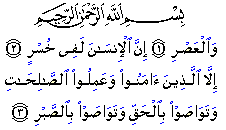Flight of Time, Good Deeds, Roadblocks to Synergy
Issue 626 » March 25, 2011 - Rabi al-Thani 20, 1432
Living The Quran
The Flight of Time
Al-Asr (The Flight of Time) - Chapter 103: Verses 1-3
 "By the flight of time, man is in total loss. Except for those who have faith and do good works; who exhort each other to uphold the truth and to perseverance."
"By the flight of time, man is in total loss. Except for those who have faith and do good works; who exhort each other to uphold the truth and to perseverance."
This brief surah summarizes the essence and outcome of all human activity for all time.
Time goes on, and people live and die, generation after generation, and era after era. People of the same generation may live under similar circumstances and traditions, but their destinies may go in totally different directions, depending on their moral and religious beliefs. The moral quality of human life is far more important, and the truth is no less honourable or illustrious if it is recognized by a minority.
Those who deny the sovereignty and power of God shall end up as fuel of hell in the hereafter, whereas the believers who, despite the odds, persevere in upholding the truth shall be the real and final winners in the ordeal of life.
True believers are few and in some generations of human history may even seem odd, but they are promised great rewards.
This surah became a motto, a pledge of loyalty and brotherhood, among the Companions of the Prophet. It was traditional, according to reports, for Prophet Muhammad's (peace be upon him) Companions to recite this surah together before they shook hands and departed.
To persevere for the sake of the truth could expose one to persecution and hardship, and therefore to uphold the true faith and triumph with it requires persistence, tenacity, and a strong will.
Compiled From:
"A Thematic Commentary on the Quran" - Muhammad Al-Ghazali, pp. 751, 752
Understanding The Prophet's Life
Good Deeds
The Prophet, peace be upon him, said: "Make the orphan come close to you, and be nice to him, and wipe his head, and feed him from your food. That will cause your heart to be soft, and your needs to be fulfilled." [al-Tabarani]
Once Anas ibn Malik was asked by someone to make dua (prayer) for him. He replied, "Verily, dua is raised up to Allah by good deeds", indicating that the questioner should strive to do good deeds if he wants his dua to be answered. And Wahb ibn Munabbih said: "The example of the one who makes dua without doing any deeds is like the one who tries to shoot arrows without a bow."
So the person who wishes to have his dua responded to by Allah should increase the quantity and quality of the good deeds that he does.
Compiled From:
"Dua: The Weapon of the Believer"- Yasir Qadhi, pp. 151, 152
Blindspot!
Roadblocks to Celebrating Differences
Although there are many, three of the largest roadblocks to celebrating differences are ignorance, cliques, and prejudice.
Ignorance. Ignorance means you're clueless. You don't know what other people believe, how they feel, or what they've been through.
Cliques. There's nothing wrong with wanting to be with those you're comfortable with; it becomes a problem only when your group of friends becomes so exclusive that they begin to reject everyone who isn't just like them. It's kind of hard to value differences in a close-knit clique. Those on the outside feel like second-class citizens, and those on the inside often suffer from superiority complexes.
Prejudice. Have you ever felt stereotyped, labelled, or pre-judged by someone because your skin's the wrong colour, your accent's too heavy, or you live on the wrong side of the tracks? Haven't we all, and isn't it a sick feeling? Although we are all created equally, unfortunately, we are not all treated equally. It's a sad fact that minorities of all types often have additional hurdles to leap in life because of prejudices held by so many. Racism is one of the world's oldest problems. We aren't born with prejudice. They're learned.
Compiled From:
"The 7 Habits of Highly Effective Teens" - Sean Covey, pp. 190-192